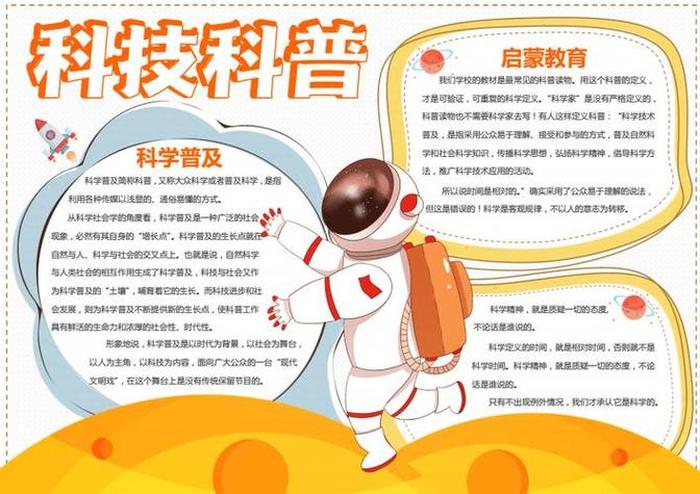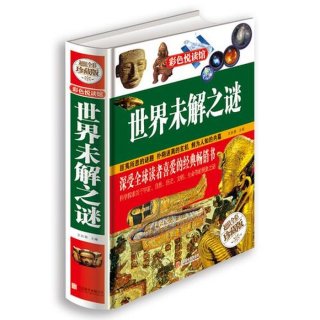关于科普知识的内容有哪些英语、科普知识手抄报的内容
-
关于,科普知识,的,内容有,哪些,英语,、,手抄,

- 知识-自由百科知识生网
- 2024-01-26 00:20
- 自由百科知识网
关于科普知识的内容有哪些英语、科普知识手抄报的内容 ,对于想学习百科知识的朋友们来说,关于科普知识的内容有哪些英语、科普知识手抄报的内容是一个非常想了解的问题,下面小编就带领大家看看这个问题。
Exploring the World of Science: A Handwritten Report on Scientific Knowledge
In this article, we will delve into the fascinating world of scientific knowledge, exploring various aspects of science and its impact on our daily lives. From the wonders of the universe to the mysteries of the human body, we will cover a wide range of topics that will surely pique your interest. So let's embark on this enlightening journey of discovery and learning!
The Wonders of the Universe
The universe is a vast and mysterious place, filled with countless stars, planets, and galaxies. Through the study of astronomy, we have gained a deeper understanding of the cosmos and our place within it. From the birth and death of stars to the search for extraterrestrial life, the field of astronomy continues to captivate and inspire us.

Stellar Phenomena
Stellar phenomena such as supernovae, black holes, and pulsars are some of the most intriguing and awe-inspiring events in the universe. By studying these phenomena, scientists have been able to unravel the secrets of the cosmos and gain insights into the fundamental forces that govern the universe.
Exoplanets and the Search for Life
The discovery of exoplanets has opened up new possibilities in the search for extraterrestrial life. By studying the atmospheres of these distant worlds, scientists hope to find clues that could indicate the presence of life beyond Earth, expanding our understanding of the potential for life in the universe.
The Role of Telescopes and Space Missions
Telescopes and space missions have played a crucial role in advancing our knowledge of the universe. From the Hubble Space Telescope to the Mars rovers, these technological marvels have provided us with unprecedented views of distant celestial objects and have enabled us to explore other planets in our solar system.
The Marvels of the Natural World
The natural world is a treasure trove of fascinating phenomena, from the intricate workings of ecosystems to the incredible diversity of life forms that inhabit our planet. Through the study of biology and ecology, we gain insights into the interconnected web of life and the complex processes that sustain it.
Biodiversity and Ecosystems
Biodiversity is essential for the health of our planet, as it ensures the stability and resilience of ecosystems. By studying the interactions between different species and their environments, scientists can better understand the delicate balance that sustains life on Earth and the potential impacts of human activities on these ecosystems.
Genetics and Evolution
The study of genetics and evolution has provided us with a deeper understanding of the mechanisms that drive the diversity of life on Earth. From the discovery of DNA to the principles of natural selection, these fields of study have revolutionized our understanding of how organisms adapt and evolve over time.
Conservation and Sustainable Practices
Conservation efforts and sustainable practices are crucial for preserving the natural world for future generations. By implementing strategies to protect endangered species and habitats, as well as promoting sustainable resource management, we can work towards ensuring the long-term health of our planet.
The Inner Workings of the Human Body
The human body is a marvel of biological engineering, with intricate systems and processes that enable us to function and thrive. Through the study of anatomy, physiology, and medical science, we gain insights into the complexities of the human body and the ways in which we can maintain our health and well-being.
Organ Systems and Functions
The human body is composed of various organ systems, each with specific functions that are essential for our survival. From the cardiovascular system to the nervous system, understanding the structure and function of these systems is crucial for maintaining good health and addressing medical conditions.

Disease Prevention and Treatment
Medical science plays a vital role in the prevention and treatment of diseases and illnesses. Through research and innovation, scientists and healthcare professionals work to develop vaccines, medications, and therapies that can improve health outcomes and enhance the quality of life for individuals around the world.
Mental Health and Well-being
Mental health is an integral part of overall well-being, and the study of psychology and neuroscience provides insights into the complexities of the human mind. By understanding the factors that influence mental health and developing strategies for support and treatment, we can work towards promoting mental well-being for all.
Environmental Science and Sustainability
Environmental science encompasses the study of the natural world and the impact of human activities on the environment. From climate change to pollution, this field of study examines the ways in which we can work towards a more sustainable and harmonious relationship with the planet.
Climate Change and Global Impacts
Climate change is one of the most pressing issues facing our planet, with far-reaching impacts on ecosystems, weather patterns, and human societies. By studying the causes and effects of climate change, as well as developing strategies for mitigation and adaptation, we can work towards a more sustainable future for our planet.
Renewable Energy and Resource Management
The transition to renewable energy sources and sustainable resource management is essential for reducing our impact on the environment. Through the development of technologies such as solar power, wind energy, and sustainable agriculture, we can work towards a more sustainable and environmentally friendly future.
Conservation and Biodiversity Preservation
Conservation efforts are crucial for protecting the diversity of life on Earth and preserving natural habitats for future generations. By implementing strategies for habitat protection, wildlife conservation, and sustainable land use, we can work towards ensuring the long-term health of our planet and the species that call it home.
Technological Advancements and Innovations
Technological advancements have revolutionized the way we live, work, and interact with the world around us. From the development of new materials to the rise of artificial intelligence, the field of technology continues to push the boundaries of what is possible and shape the future of our society.
Information Technology and Communication

Information technology has transformed the way we communicate, access information, and conduct business. From the internet to mobile devices, these technological innovations have revolutionized the way we connect with others and access a wealth of knowledge and resources.
Biotechnology and Medical Innovations
Biotechnology has led to groundbreaking advancements in medicine, agriculture, and environmental science. From the development of new medications and therapies to the creation of genetically modified crops, these innovations have the potential to improve health outcomes and address pressing global challenges.
Artificial Intelligence and Automation
Artificial intelligence and automation have the potential to revolutionize various industries, from manufacturing to healthcare. By harnessing the power of machine learning and robotics, we can streamline processes, improve efficiency, and develop new solutions to complex problems.
The Future of Science and Scientific Literacy
As we look towards the future, it is clear that scientific literacy and engagement will play a crucial role in addressing global challenges and shaping the world of tomorrow. By fostering a deeper understanding of science and its impact on society, we can work towards a more informed and empowered global community.
Science Education and Outreach
Science education and outreach initiatives are essential for promoting scientific literacy and fostering a sense of curiosity and wonder about the world around us. By engaging students and the public in hands-on learning experiences and interactive demonstrations, we can inspire the next generation of scientists and innovators.
Ethical Considerations and Responsible Innovation
As we continue to push the boundaries of scientific discovery and technological innovation, it is crucial to consider the ethical implications of our actions. By promoting responsible research practices and ethical decision-making, we can ensure that scientific advancements are made in a manner that benefits society as a whole.
Global Collaboration and Knowledge Sharing
Global collaboration and knowledge sharing are essential for addressing complex global challenges and advancing scientific knowledge. By working together across borders and disciplines, we can leverage the collective expertise and resources of the global scientific community to tackle pressing issues and drive positive change.
In conclusion, the world of scientific knowledge is vast, diverse, and full of wonders waiting to be discovered. From the mysteries of the universe to the complexities of the natural world and the advancements of technology, science continues to shape our understanding of the world and our place within it. By fostering scientific literacy, promoting ethical innovation, and working together on a global scale, we can harness the power of science to address pressing global challenges and create a brighter future for all.
以上是关于关于科普知识的内容有哪些英语、科普知识手抄报的内容的介绍,希望对想学习百科知识的朋友们有所帮助。
本文标题:关于科普知识的内容有哪些英语、科普知识手抄报的内容;本文链接:http://yszs.weipeng.cc/zs/524236.html。
猜你喜欢
- 高中生必会的名著文学常识;七上文学常识 2024-01-12
- 飘过的知识 - 动态视力与静态视力 2024-01-12
- 霸王龙的生活常识;中国十大恐龙 2024-01-12
- 防止校园欺凌的小常识简短、防校园欺凌知识内容 2024-01-12
- 适合小孩子的航天小知识;航天科普小知识 2024-01-12
- 踏入社会一定要知道的事情 - 走出社会如何锻炼自己 2024-01-11
- 趣味科普知识小短文 科普小知识大全 2024-01-11
- 谈谈你对知识经济的理解、谈谈你对管理的理解 2024-01-11
- 讲一个冷知识,一些很实用的冷知识 2024-01-11
- 蚊子的冷知识搞笑 关于蚊子的幽默笑话 2024-01-11
























